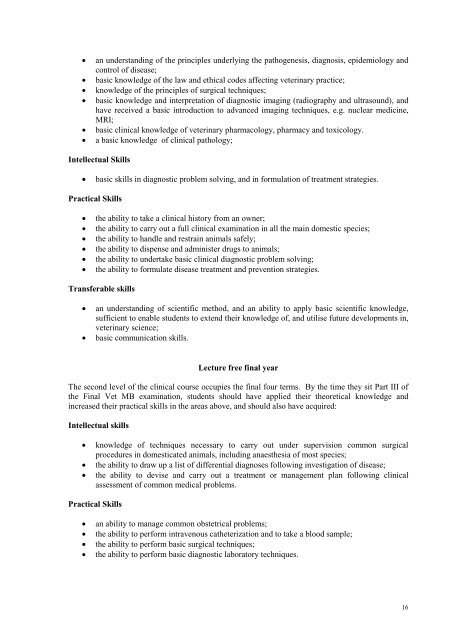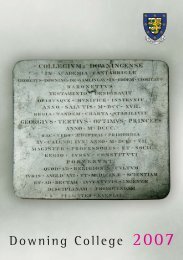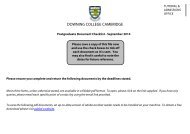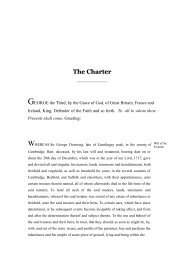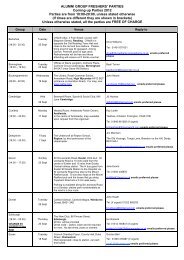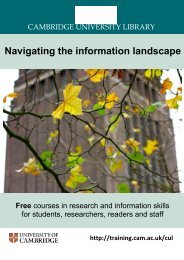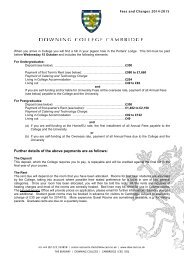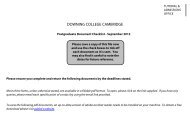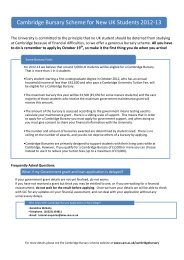veterinary students handbook the first two years - Downing College
veterinary students handbook the first two years - Downing College
veterinary students handbook the first two years - Downing College
You also want an ePaper? Increase the reach of your titles
YUMPU automatically turns print PDFs into web optimized ePapers that Google loves.
• an understanding of <strong>the</strong> principles underlying <strong>the</strong> pathogenesis, diagnosis, epidemiology and<br />
control of disease;<br />
• basic knowledge of <strong>the</strong> law and ethical codes affecting <strong>veterinary</strong> practice;<br />
• knowledge of <strong>the</strong> principles of surgical techniques;<br />
• basic knowledge and interpretation of diagnostic imaging (radiography and ultrasound), and<br />
have received a basic introduction to advanced imaging techniques, e.g. nuclear medicine,<br />
MRI;<br />
• basic clinical knowledge of <strong>veterinary</strong> pharmacology, pharmacy and toxicology.<br />
• a basic knowledge of clinical pathology;<br />
Intellectual Skills<br />
• basic skills in diagnostic problem solving, and in formulation of treatment strategies.<br />
Practical Skills<br />
• <strong>the</strong> ability to take a clinical history from an owner;<br />
• <strong>the</strong> ability to carry out a full clinical examination in all <strong>the</strong> main domestic species;<br />
• <strong>the</strong> ability to handle and restrain animals safely;<br />
• <strong>the</strong> ability to dispense and administer drugs to animals;<br />
• <strong>the</strong> ability to undertake basic clinical diagnostic problem solving;<br />
• <strong>the</strong> ability to formulate disease treatment and prevention strategies.<br />
Transferable skills<br />
• an understanding of scientific method, and an ability to apply basic scientific knowledge,<br />
sufficient to enable <strong>students</strong> to extend <strong>the</strong>ir knowledge of, and utilise future developments in,<br />
<strong>veterinary</strong> science;<br />
• basic communication skills.<br />
Lecture free final year<br />
The second level of <strong>the</strong> clinical course occupies <strong>the</strong> final four terms. By <strong>the</strong> time <strong>the</strong>y sit Part III of<br />
<strong>the</strong> Final Vet MB examination, <strong>students</strong> should have applied <strong>the</strong>ir <strong>the</strong>oretical knowledge and<br />
increased <strong>the</strong>ir practical skills in <strong>the</strong> areas above, and should also have acquired:<br />
Intellectual skills<br />
• knowledge of techniques necessary to carry out under supervision common surgical<br />
procedures in domesticated animals, including anaes<strong>the</strong>sia of most species;<br />
• <strong>the</strong> ability to draw up a list of differential diagnoses following investigation of disease;<br />
• <strong>the</strong> ability to devise and carry out a treatment or management plan following clinical<br />
assessment of common medical problems.<br />
Practical Skills<br />
• an ability to manage common obstetrical problems;<br />
• <strong>the</strong> ability to perform intravenous ca<strong>the</strong>terization and to take a blood sample;<br />
• <strong>the</strong> ability to perform basic surgical techniques;<br />
• <strong>the</strong> ability to perform basic diagnostic laboratory techniques.<br />
16


